|
|
|
Sort Order |
|
|
|
Items / Page
|
|
|
|
|
|
|
| Srl | Item |
| 1 |
ID:
137191
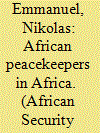

|
|
|
|
|
| Summary/Abstract |
African states today are strongly encouraged by the United States (US) and other members of the international community to play a more central role in confronting crises on the continent. Indeed, in recent years African armed forces have increasingly served as the backbone supporting various peacekeeping operations in the region. It is important to add that the international community has frequently tried to facilitate the deployment of African armed forces with aid and training. From this reality, the following study goes beyond the current literature by focusing on the international factors behind African participation in United Nations (UN) peacekeeping operations in Africa. In doing so, this research focuses on US military aid and foreign troop training from 2002 to 2012, and its impact on African deployments into UN peacekeeping missions in Africa. As can be expected, such third-party help appears to be an important motivating factor encouraging African troop deployment into crises on the continent.
|
|
|
|
|
|
|
|
|
|
|
|
|
|
|
|
| 2 |
ID:
137190


|
|
|
|
|
| Summary/Abstract |
According to the International Committee of the Red Cross (ICRC) publication Interpretive Guidance on the Notion of Direct Participation in Hostilities under International Humanitarian Law, all civilians (including child soldiers) lose their immunity from direct targeting ‘for so long as’ their actions amount to direct participation in hostilities. All civilians can, however, access the revolving door of protection and return to their civilian activities – complete with full immunity from direct targeting – provided the nature of their direct participation was spontaneous and disorganised. Once it can be ascertained that their participation in hostilities amounts to continuous combative functions, they relinquish their access to the revolving door of protection, and can be targeted at all times until they abandon their formal or functional membership of the belligerent group. This piece analyses how the revolving door phenomenon and the notion of continuous combative functions apply in instances where civilian child soldiers are directly participating in hostilities.
|
|
|
|
|
|
|
|
|
|
|
|
|
|
|
|
| 3 |
ID:
137204
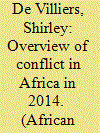

|
|
|
|
|
| Summary/Abstract |
Violent conflict escalated in Africa in 2014, with five sub-Saharan states – the Central African Republic (CAR), Nigeria, Somalia, South Sudan and Sudan – accounting for an estimated 75% of all conflict-related deaths on the continent. This paper provides an overview of the five major sub-Saharan African conflicts in 2014 and considers the underlying causes and dynamics in the Seleka/anti-Balaka conflict in the CAR, the Islamist threats of Boko Haram and al-Shabaab in Nigeria and Somalia, the civil war in South Sudan, and the long-running conflict between Sudan's government and southern and Darfuri rebels. The paper unpacks the general trends evident in these conflicts and the implications for the settlement thereof, including the targeting of civilians, ethnic and religious mobilisation and the state as epicentre of violence. The paper concludes with a brief look ahead to 2015.
|
|
|
|
|
|
|
|
|
|
|
|
|
|
|
|
| 4 |
ID:
137192
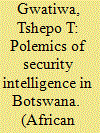

|
|
|
|
|
| Summary/Abstract |
This article discusses the validity of national security threats in Botswana and whether they justified the creation of the Directorate of Intelligence and Security Services (DISS), which has been controversial since its formation. Since its inception in 2008, the DISS has been accused of many human rights violations and politicisation. Without fully deliberating on the basis for its creation, some discourses have focused on the politicised operations without relation to what the DISS is supposed to be doing. The author works under the assumption that debates should be shaped by whether it was necessary to create the DISS, and, if so, how we can shape and steer debates on its oversight, management, reform and operations. This article argues that despite the politicisation of the DISS, Botswana's national security threats are both real and imagined; and that domestic threats to national security have moved from the conceptual ‘imagined’ category to the ‘real’. However, that in itself did not warrant the design and mandate of the DISS, and the article argues that it was external threats that really warranted the creation of a civilian intelligence agency. The article concludes that Botswana faces a plethora of external security threats – traditional and non-traditional – that warranted the creation and continuance of the DISS.
|
|
|
|
|
|
|
|
|
|
|
|
|
|
|
|
| 5 |
ID:
137200


|
|
|
|
|
| Summary/Abstract |
Using crime review figures for four randomly selected states in Nigeria, this study examines cases of kidnapping and its implications for the national economy. The findings reveal that kidnapping is consistently on the increase in Nigeria and is not evenly spread across regions. It is shown that 15 cases were recorded in 2005 and 43 cases in 2008. In 2009, 138 cases were officially recorded, of which 22% and 76% occurred in Rivers and Edo states respectively. Findings further showed that modern kidnapping in Nigeria is triggered by resource control disputes directed both at oil expatriate workers and at prominent citizens, politicians and members of their families. The crisis, which came to the fore in 2005, has forced oil production shutdowns of up to 800 000 barrels per day. The study concludes that kidnapping is becoming a serious crime in Nigeria with significant negative implications for foreign investment, national foreign exchange earnings, and revenue generation.
|
|
|
|
|
|
|
|
|
|
|
|
|
|
|
|
| 6 |
ID:
137202
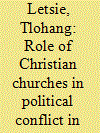

|
|
|
|
|
| Summary/Abstract |
This paper examines the role played by Christian churches in political conflict in Lesotho. It argues that Christianity has played changing roles in the conflict that has characterised Lesotho's politics since 1970. At first, the two largest Christian denominations – the Roman Catholic Church (RCC) and the Lesotho Evangelical Church (LEC) – were associated with the rival Basotho National Party and Basutoland Congress Party (and its offshoots) respectively. The differences between the two denominations trickled down and became a source or intensifier of political conflict. All this happened while the leadership of the two churches worked together, amid high mistrust, within the Christian Council of Lesotho. The political polarity between the ‘Congress’ and the ‘Nationalist’ streams subsided with the splits within the Congress parties and subsequent formation of new parties. On the other hand, mistrust between the leadership of the RCC and the LEC subsided following a change of leadership in the two churches, together with one in the Anglican Church of Lesotho in the first decade of the 21st century. Following these developments, there ceased to be a link between Christian denominations and political conflict in the country. The Christian churches have recently become the most reliable mediators in political conflict.
|
|
|
|
|
|
|
|
|
|
|
|
|
|
|
|
| 7 |
ID:
137201
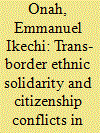

|
|
|
|
|
| Summary/Abstract |
This paper is a study of the phenomenon of trans-border ethnic relations and its impact on national integration and citizenship in the countries of West and Central Africa where trans-border ethnic groups exist. Despite the existence of many such groups in these regions, and the numerous problems associated with the continued relations among these groups across their countries of abode, the phenomenon has not been seriously studied, especially as it concerns the identification of members of such groups and how they are viewed by members of other ethnic groups, as citizens of one country or the other. This paper notes that trans-border ethnic solidarity ordinarily presents the relevant African states with two possibilities, namely: enormous benefits accruing from regional integration and cooperation among states harbouring fractions of trans-border ethnic groups; or, debilitating conflicts within and between these states. It is the reality of the latter possibility that this paper examines. The states and the international system are often incapable of containing this phenomenon of trans-border ethnic solidarity and usually respond in hostile ways, ultimately manifesting in citizenship problems. The study shows, however, that what is needed is not conflict but cooperation – within and between states having fractions of a trans-border ethnic group, and within the international system, for the enhancement of national citizenship and development in West and Central Africa.
|
|
|
|
|
|
|
|
|
|
|
|
|
|
|
|
|
|
|
|
|